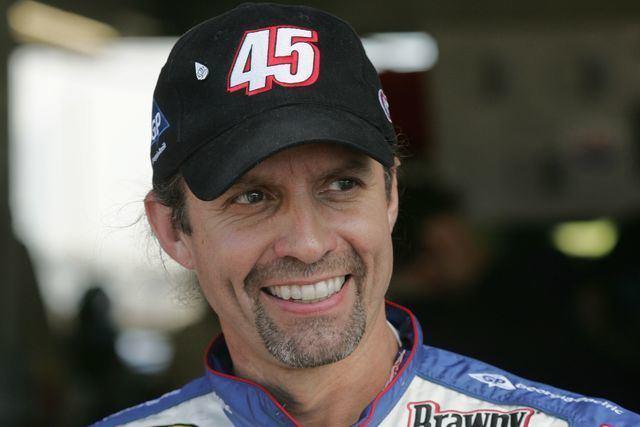Contributing editor
- FMA
- The Fabricator
- FABTECH
- Canadian Metalworking
Categories
- Additive Manufacturing
- Aluminum Welding
- Arc Welding
- Assembly and Joining
- Automation and Robotics
- Bending and Forming
- Consumables
- Cutting and Weld Prep
- Electric Vehicles
- En Español
- Finishing
- Hydroforming
- Laser Cutting
- Laser Welding
- Machining
- Manufacturing Software
- Materials Handling
- Metals/Materials
- Oxyfuel Cutting
- Plasma Cutting
- Power Tools
- Punching and Other Holemaking
- Roll Forming
- Safety
- Sawing
- Shearing
- Shop Management
- Testing and Measuring
- Tube and Pipe Fabrication
- Tube and Pipe Production
- Waterjet Cutting
Industry Directory
Webcasts
Podcasts
FAB 40
Advertise
Subscribe
Account Login
Search
7 Questions for FABTECH keynote Kyle Petty
Son of “The King,” verbatim
- By Kate Bachman
- September 5, 2018
Racing icon Kyle Petty will be the keynote speaker at FABTECH® 2018 in Atlanta on the morning of Wed., Nov. 7. Petty has lived the sport from many perspectives—on a pit crew; as an eight-time NASCAR-race-winning driver; as the son of NASCAR’s “The King” Richard Petty; and as a regular media commentator, race team businessman, and generous philanthropist. In “What a Ride: Life, Family, Community, and the Race Track,” he’ll be speaking about his life in racing, growing up around race cars, working on race cars, and his family’s legacy—where it is now and what the future holds.
The FABRICATOR® had a chance to catch up with Petty to ask some questions before the event:
1. The FABRICATOR: A large number of metal fabricators—and probably most of the people who will be in your audience—are avid NASCAR fans. Why do you think NASCAR has such an appeal for metal manufacturers? What is the connection?
Petty: That is what NASCAR was in the beginning—steel-bodied, American-made cars tweaked and modified to run faster than their original design intended. The good mechanics knew how to cut, weld, change, and replace original parts with homemade fabricated parts that made the cars faster and more durable.
2. FAB: As a consultant for your father’s race team, can you describe the fabrication done there? How large is the metal fabrication body shop for building stock race cars? What equipment and tooling do they currently use? How has technology changed the body fabrication?
Petty: Richard Petty Motorsports is now partnered with Richard Childress Racing. The fab shop constitutes about one-third of the total shop. It turns out a couple cars a week. They use typical metal fabricating equipment, CNC technology, and a lot of what they use is proprietary, so I can’t get too specific with the details. Technology has changed everything. A few years ago, quarter panels and fenders were fabricated by hand. Now they are stamped and assembled.
3. FAB: A large contingent of our fabricator readers and members are part of a family business. What was it like growing up in a family business? What was it like to have a father that the sport still calls “The King?” What was it like to sit down to a Thanksgiving dinner? Did you all talk shop or not?
Petty: Our family business was just like any other family business—with the happiness and joys, trials and tribulations that come with any other family business. Ours just happened to involve race cars. I don’t mean this in a flippant way, but he’s the only father I ever had. I have nothing else to compare it to. He was just my father. My sisters and I never looked at him as “The King.” Racing was always the No. 1 topic of conversation in our family—at work, at home, over the holidays, and at the dinner table.
4. FAB: General-use vehicles that traditionally were 100 percent steel fabricated are now made with a wide variety of materials, including composites. What are your thoughts about how composites, plastics, and alternative metals are replacing some steel in NASCAR vehicle components?
Petty: The world changes. If we don’t change along with the world, we get left behind. In recent years, vehicles have gone from carbureted engines to fuel injection. It’s hard to even find a carburetor at a parts store these days. Carburetion is old technology. The blending of composites into the metal world is where technology is taking us. NASCAR has followed suit. Where we go from here, I’m not sure.
5. FAB: One of the more admirable things that you have become famous for is your development of Victory Junction camp for children with serious or chronic illnesses. What inspired you to launch it? Are you still as involved as you were in the beginning?
Petty: You have to go back to 1995 to answer that. In 1995, I started the Kyle Petty Charity Ride Across America, a cross-country charity motorcycle ride that raises funds for chronically ill children. We are now in our 24th year and have raised over $18 million.
I became involved with Paul Newman through sports car races. In 1998, [son] Adam and I did a motorcycle ride in Florida raising funds for Boggy Creek Camp, part of Paul Newman’s Hole in the Wall Camp Association. Adam wanted to know why we didn’t have a camp like that in North Carolina. After his [fatal] accident, that became my passion. My parents donated about 90 aces of their land and the idea took off from there.
The NASCAR community was instrumental in helping to bring Adam’s dream to life. So many drivers helped make it a reality with their donations. I’m not involved in the day-to-day operations, but I talk to the CEO on a weekly basis, I’m chairman of the board, and visit camp as often as my NBC schedule allows.
6. FAB: In your career, you have worked on a pit crew; raced and won eight times; been involved in your father’s race team; appeared as a commentator; headed up Victory Junction; and now are on the speaker circuit. What has been the highlight of your varied career so far?
Petty: From a career perspective, the highlight was being a fabricator—first on the Oldsmobile that my dad won the Daytona 500 with in 1979 and then working in the garage area of Charlotte Motors Speedway after Adam wrecked in practice to put his car back together. I watched him go on to win his first ARCA race that same weekend.
7. FAB: Do you think the France family, majority owners of NASCAR, will sell its interests in NASCAR?
Petty: My magic 8 ball says “All indications point to yes.”
subscribe now

The Fabricator is North America's leading magazine for the metal forming and fabricating industry. The magazine delivers the news, technical articles, and case histories that enable fabricators to do their jobs more efficiently. The Fabricator has served the industry since 1970.
start your free subscriptionAbout the Author

Kate Bachman
815-381-1302
Kate Bachman is a contributing editor for The FABRICATOR editor. Bachman has more than 20 years of experience as a writer and editor in the manufacturing and other industries.
- Stay connected from anywhere

Easily access valuable industry resources now with full access to the digital edition of The Fabricator.

Easily access valuable industry resources now with full access to the digital edition of The Welder.

Easily access valuable industry resources now with full access to the digital edition of The Tube and Pipe Journal.
- Podcasting
- Podcast:
- The Fabricator Podcast
- Published:
- 04/16/2024
- Running Time:
- 63:29
In this episode of The Fabricator Podcast, Caleb Chamberlain, co-founder and CEO of OSH Cut, discusses his company’s...
- Trending Articles
Tips for creating sheet metal tubes with perforations

JM Steel triples capacity for solar energy projects at Pennsylvania facility

Are two heads better than one in fiber laser cutting?

Supporting the metal fabricating industry through FMA

Omco Solar opens second Alabama manufacturing facility

- Industry Events
16th Annual Safety Conference
- April 30 - May 1, 2024
- Elgin,
Pipe and Tube Conference
- May 21 - 22, 2024
- Omaha, NE
World-Class Roll Forming Workshop
- June 5 - 6, 2024
- Louisville, KY
Advanced Laser Application Workshop
- June 25 - 27, 2024
- Novi, MI



























